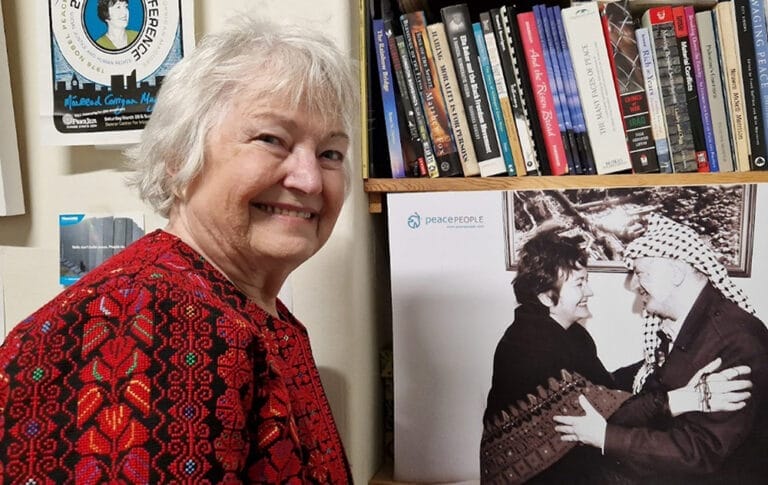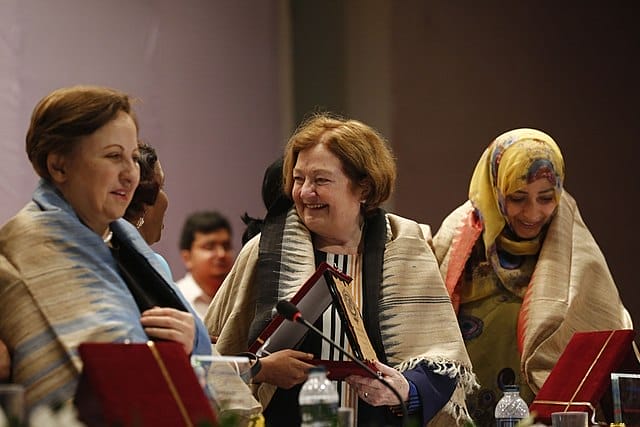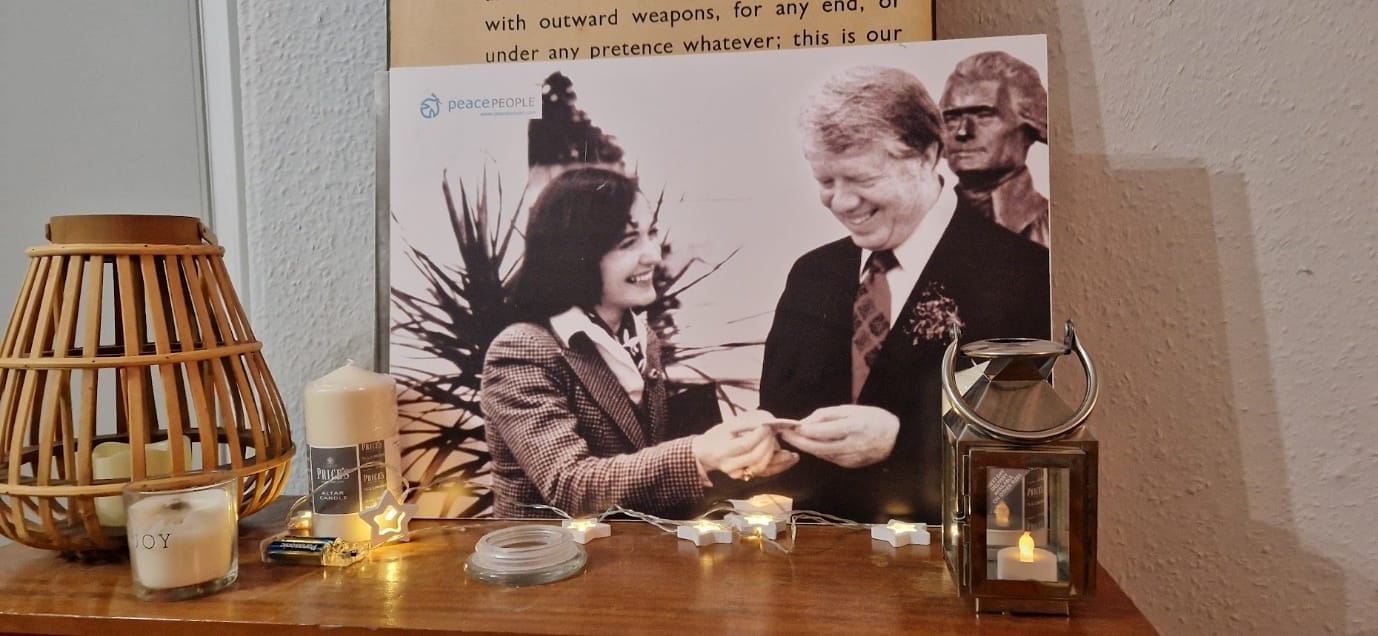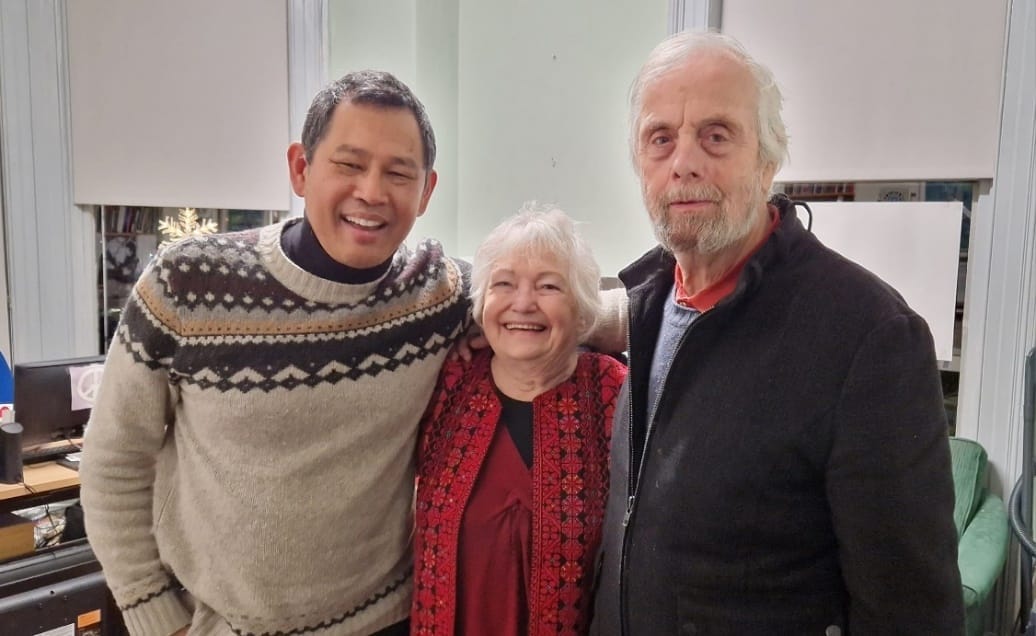“Israel cannot build peace on genocide. We have got to find more humane ways to solve our problems.”
As the host of FORSEA Dialogue Series on Democratic Struggles established to educate grassroots activists keen to learn about contemporary struggles for peace, justice and liberty, the exiled Burmese dissident and genocide scholar Dr Maung Zarni interviewed the 1976 Nobel Peace Laureate Mairead Maguire. She is renowned worldwide for her grassroots campaign to build “peace by peace” in her native Northern Irish city of Belfast.
In the 30-minutes interview, the Northern Irish activist shared her grounded perspectives on a wide raging subject of historical and contemporary importance.
Her views are grounded because she has done her homework very well and because she has personal knowledge of things in which she has publicly weighed in on, with her impeccable moral voice rooted in her Christian upbringing whereby devotees are taught “God is love”.
She talked passionately about the devastating US-led sanctions against Iraq where she witnessed children lying in hospital beds waiting to die because of the lack of medicine.
Importantly, she recounted her conversation with Saddam Hussein’s Foreign Minister Tariq Aziz, who told her, “Iraq was doing everything to make peace with the United States.” The US Secretary of State James Baker openly threatened Saddam’s representative to the world, “we will bomb Iraq if you don’t do what we tell you to do.”
The then US President George W. Bush was quoted in USA Today as having characterized Aziz, Number 12 on US’s Wanted List, someone who “doesn’t know how to tell truth”. Aziz was Number 12 on US’s Wanted List drawn up before the second and illegal invasion of Iraq in 2002, and he was captured in Bagdad and questioned in captivity by US interrogators.
For Aziz was unable to tell his American captors whereabouts of Saddam’s non-existent Weapons of Mass Destruction (WMD).
Here is USA Today reportage on 3 May 2003: “President Bush expressed unshakable confidence Saturday about finding banned weapons in Iraq and complained that Tariq Aziz, one of Saddam Hussein’s closest deputies, is not cooperating with U.S. forces who have him in custody. Bush said the deputy prime minister, the most visible face of the former Iraqi government other than Hussein, ‘still doesn’t know how to tell the truth.”
In Palestine, she witnessed the horrific human conditions of Gazans who have been subjected to Israel’s 16-years-long blockade of Gaza, which former of Israel’s internal security agency Shin Bet and retired admiral Ami Ayalon, “an open-air prison”.
Israeli security forces deported her from the Occupied Palestine three times as she and her team of international peace activists attempted to break the Israeli blockade by, setting sail on Freedom Flotilla.

Mairead Maguire, in her office, standing in front of the old black and white picture of her meeting with the late Yasar Arafat in Palestine. In his memory and that of Palestinians killed, over the past 75 years, by Israel, Maguire wore the hand-woven Palestinian jacket, with the pattern of little squares each representing a village destroyed by the Zionist terrorists during the Palestinians’ Holocaust – known as the Nakba, or the Catastrophe, of 1948. (Photo by Maung Zarni)
Maguire displayed a razor-sharp moral clarity when she said, “Zionism is just evil,” with her spot-on analysis of what the Zionist project of creating the Jewish Homeland by seizing, with relentless and sustained violence, the land that belongs to the Arabs indigenous to Palestine, or the Palestinian people. She added, “Israel only wants the land, but not the Palestinian people.”
Many “Jews with conscience” would agree with Maguire’s blunt take on political Zionism, the founding ideology of Israel. Robert Lemkin, an Oxford-based acclaimed filmmaker, who contributed a solo piano performance in support of Free Palestine on FORSEA’s 5-hour YouTube LIVE event stated that his late mother who was in charge of Britain’s WWII-era Kindertransport initiative for West London Synagogue, was “a lifelong opponent of political Zionism”. Her uncle and entire family in the Nazi-occupied Czechoslovakia were “liquidated” at Auschwitz-Birkenau.
More recently, in her no-hold-barred analysis entitled “A Jewish Plea: Stand Up to Israel’s Act of Genocide” (Boston Review, 13 October, 2023), Stephanie Fox, Executive Director of the Jewish Voice for Peace, which is the world’s largest organization of “Jews with conscience” opposing the Zionist Israel as the apartheid colonizer, elaborated on the Zionism and its deadly project for the Palestinians. In Fox’s own words:
“Since the founding of the state of Israel, the Zionist movement has positioned the domination and oppression of Palestinians and the colonization of Palestinian land as the answer to the very real question of Jewish safety. They have taken the very real pain and trauma that we as Jews carry and sharpened it into a deadly weapon. We desperately must understand that what is happening is not a cycle of violence. It is a system of violence. Everyone is caught in its teeth.
It is the system of settler colonial apartheid that the Israeli government has built and maintained over the past seventy-five years—with billions upon billions of dollars from the United States. Settler colonialism is a structure, a language, a culture, an ideology—an interlocking, totalizing, system of violence. It is a machine of war and dehumanization against Palestinians. It is this system that imperils the lives and safety of everyone.”
In his latest essay “All that remains” (Prospect, Jan/Feb. 2024), the Baghdad-born Israeli Jewish historian at Oxford University offered a new history of Israel’s founding in 1948, and what it entails for the native Palestinians:
From whatever perspective one chooses to view it, the establishment of the state of Israel in May 1948 involved a monumental injustice to the Palestinians. Three quarters of a million Palestinians became refugees, and the name Palestine was wiped off the map. Israelis calls it “The War of Independence”; Palestinians call it the Nakba, or the catastrophe. The most horrific event in the suffering-soaked history of the Jews was the Holocaust. In the history of the Palestinian people, the most traumatic event is the Nakba, which is not in fact a one-off event but the ongoing process of the dispossession and displacement of Palestinian people from their homeland that continues to this day, in the unspeakable horrors being visited by the Israeli Defence Forces (IDF) on Gaza.

Mairead Maguire, Shirin Ebadi and Tawakkol Karman talk about Rohingya issues; Bangadesh, 2018. Wikipedia Commons
Maguire’s passions for peace and justice have also taken her to Bangladesh in February 2018 where she and two other members of the Nobel Women’s Initiatives – met with Rohingya survivors of Myanmar genocide in one of the world’s largest refugee camps in Cox’s Bazaar, and listened to their tales of mass rape and slaughter at the hands of Myanmar security forces. The trio of distinguished activist visitors – Iran’s Shirin Ebadi, Yemen’s Tawakkol Karman, and Maguire – met with the Prime Minister Sheik Hasina and pressed the latter to take Myanmar to the International Court of Justice, the United Nation’s court of member states, for breaching the Convention on the Prevention and Punishment of the Crime of Genocide, of which both Myanmar and Bangladesh are “state parties”, or signatory states.
A few years later in 2020, Gambia invoked the above-mentioned binding inter-state treaty against Myanmar. Infamously, Aung San Suu Kyi, Maguire’s sister Nobel Peace laureate, showed up at the world’s court “on the side of genocide perpetrators”.
Maguire said, “I knew her husband (the late Michael Aris) very well. On many occasions, I campaigned with him for his wife’s release during her house arrests.” Maguire found Aung San Suu Kyi’s stance “desperately disappointing”.
The trip to Cox’s Bazaar was not her first attempts to support the wretched of Myanmar, or the Burmese dissidents opposing through non-violence the country’s genocidal military dictatorship. Two decades earlier Maguire joined a group of Nobel Peace laureates including the late Archbishop Desmond Tutu and Rigoberta Menchu in Thailand. They wanted to shine a spotlight on Myanmar military’s egregious rights violation and violent repression against different ethnic communities of Myanmar, besides a political persecution of a fellow Nobel laureate. They travelled from Bangkok to the Thai-Burmese borders which was home to 250,000 Karen war refugees forcibly displaced by Myanmar military’s scorch-earth operations.

A picture of Mairead Maguire with the then US President Jimmy Carter at the White House; Peace People House, Lisburn, Belfast. 11 Dec. 2023 (Photo by Maung Zarni)
The Northern Irish peace campaigner is not naively preaching peace in a world run by deeply immoral forces and actors. Her activism is anchored in a structural analysis that connects political states, governments and corporations. She sees how politicians and government officials “sell their own people” down the river to multinational corporations. Undaunted, she talked about how a small group of dedicated grassroots campaigners could permanently shut down a US arms manufacturer Raytheon in Derry, 90-minutes’ drive from Belfast.
To fully understand Maguire’s faith in the power of people working together for common good, a close look at her own personal background.
Born in 1944, Maguire grew up as an ordinary citizen in the working-class Catholic neighbourhood in West Belfast which had long suffered the sectarian violence between the Protestant loyalists to the UK and the Catholic Irish.
One big tragic event turned her into a relentless campaigner for peace and reconciliation.
Belfast in those days was, effectively, a British army garrison town, trying to keep order on the streets where the Irish Republican Army and the armed Unionist organization Ulster Defence Association battled each other. [According to a BBC documentary series, London was hardly a neutral party; but rather, it infiltrated both organizations, which it gave a list of targets from respective movements to, well, eliminate one another.]
In August 1976, Maguire lost three family members; niece Joanne (8), and nephews Andrew (6 weeks) and John (2½) – in a roadside accident in Belfast caused by an out-of-control car driven by a Provisional Irish Republican Army member. Andrew was in a pram when the car hit the family.
A British trooper sniped the man behind the wheel, whom they suspected to be an IRA. The driver was instantly killed by the sniper fire, and the driver-less car consequently swerved, hit and killed the three children on the spot, while their mother Anne, Maguire’s sister, was left “dangerously ill” and subsequently succumbed to death.
Maguire subsequently teamed up with two fellow local residents – Betty Williams, an eyewitness to the fatal accident, and Ciaran McKeown, a young journalist – to start organizing rallies and marches demanding peace under the banner of Peace People. The Norwegian Nobel Committee had recognized Peace People’s movement, and two of the co-founders Maguire and Williams, with the Nobel Peace Prize for 1976.
Since the signing of the Good Friday Agreement, peace has been established in Ireland. The days of “the Troubles,” as the sectarian strife between the Catholic Irish and the pro-British Protestants in the state was referred to, are over. But Mairead has since remained a tireless and principled champion of peace, justice and freedom in national communities similarly marred by decades of violent conflicts, repression, and genocides.
Her passions for “resolving our problems through more humane ways” have led her to embrace a more global outlook which connects her to the wretched of the earth, whatever their names or geography.

FORSEA Interview Host Maung Zarni seen with Mairead Maguire and her husband Jacky Maguire, Peace People House, Lisburn, Belfast, 11 Dec. 2023
No interview with this truly remarkable peace activist would be complete without a mention about Maguire, the person. Guided by her Christian faith, she exudes warmth, humility, and belief in the universal fellowship of humans. At 79, she looked more physically fail than when the FORSEA interview host met her at the bi-annual conference of the Parliament of the World’s Religions in Salt Lake City, Utah, USA for the first time in October 2015.
But her mind remains razor sharp, and her speech coherent and her arguments for peace as cogent and inspiring as ever. Since Hamas’ attacks of 7 October, one often hears the phrase “Judaeo-Christian Civilization” (presumably vis-à-vis Islamic militancy or “savagery”), from the lips of Israeli Prime Minister Netanyahu and Israel’s high profile supporters including the likes of Alan Dershowitz. In the most perverted way, Western supporters of Israel have hoisted the flag of “(Western) Civilization” while arming, financing and protecting the “one and only Jewish state”, as it has institutionalized the policy of genocidal displacement and destruction of the native population of Palestinian over the last 70-years.
Mairead Maguire sets a high bar for other activists, Nobel Prize winners or not, to “speak truths to power,” no matter the price. Long before Amnesty International advocated for the freedom of the WikiLeaks founder Julian Assange, Maguire has championed the cause of Julian Assange twice whom she met at the Ecuadorian Embassy when he was holed up there. Going against the currents, she nominated Assange twice for the Nobel Peace Prize. She said, “Julian Assange is a very brave man.”
And so is Mairead Maguire for typically going against the prevailing elite opinion, as misguided and morally warped it is, about the man who knowingly risked his life to tell the world the evil deeds which the most powerful state on earth has been carrying out, globally, while maintaining its soft power, with a façade of it as “a beacon of freedom, democracy and human rights”.
Unlike the political class and the corporate elite, that reign in the Global North, Maguire was sober, self-reflective and brutally honest when she said, “I feel deeply ashamed that I came from a Western place where we have allowed our governments to kill so many people (around the world).”
… For oil. For Land. For corporate profits. For imperialists’ economic security.
Today’s deeply troubled and violent world desperately needs to hear from anti-imperialist citizens of the world who refuse to be divided along these “civilizational” lines or geopolitical and corporate interests and who dare speak truth to power. Mairead Maguire is one of these voices whose grounded and wise words need to be heeded.
Maung Zarni
The Interview was recorded December 11, 2023.
